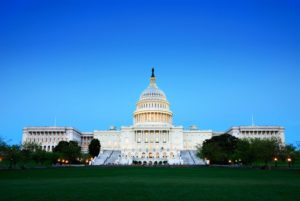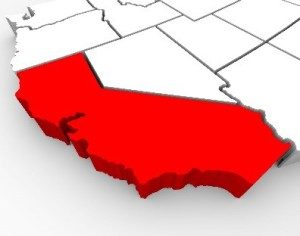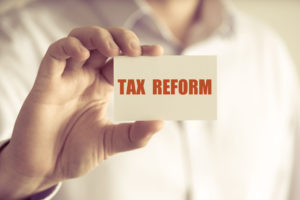This Year's Omnibus Bill: What About Internet Sales Tax?

Last week Congress passed the 2018 omnibus spending bill after finalizing the language at the last minute. Lawmakers on both sides of the aisle, specifically Rep. Kristi Noem, were pushing to include online sales tax legislation, but ultimately the House's chief deputy whip, Rep. Patrick McHenry, "Signaled...that Noem’s measure won’t be included in the omnibus and hasn’t had enough vetting."
About the Online Sales Tax Provision
Rep. Noem made an aggressive push to add the online sales tax legislation to the bill last minute. As The Hill explains:
Supporters of the legislation argue that it will allow states to collect money already owed to them and put online retailers on the same playing field as brick-and-mortar stores. They also argue that there's urgency for Congress to act now, before the Supreme Court acts on a case on the topic this year.
California Attacks Border Wall- Maybe?
 The Federal Government’s proposed border wall with Mexico has been getting a lot of attention lately, particularly since the president recently visited the Golden State. One California legislator has an interesting take on the ongoing disagreement between California and the White House. Assemblyman Phil Ting, of CA, recently announced his bill, A.B. 2355, as a way to incentivize companies not to participate in the building of the wall.
The Federal Government’s proposed border wall with Mexico has been getting a lot of attention lately, particularly since the president recently visited the Golden State. One California legislator has an interesting take on the ongoing disagreement between California and the White House. Assemblyman Phil Ting, of CA, recently announced his bill, A.B. 2355, as a way to incentivize companies not to participate in the building of the wall.
Wayfair v. South Dakota: What Are The Possible Outcomes of the Online Sales Tax Case?

Earlier this year we shared the U.S. Supreme Court would hear a case related to online sales tax: Wayfair v. South Dakota. This ruling could settle how online purchases are taxed, potentially overturning the 1992 Quill Corp v. North Dakota ruling currently preventing states from collecting sales tax from sellers without a physical presence (or nexus) in the state.
Why is it worth it for the Supreme Court to consider this case rather than fall back on the previous Quill ruling? The world has changed a lot since 1992. As The Wall Street Journal reports, "In 1992, the justices 'did not and could not anticipate the development of modern e-commerce,' Solicitor General Noel Francisco wrote in a friend-of the-court brief."
According to The Hill, "The Trump administration, several members of Congress, state governments and major retail groups want the Supreme Court to uphold a South Dakota sales tax law. They say states should be able to require the collection of sales taxes from businesses with a significant economic presence in their jurisdictions. Other lawmakers, conservative groups and e-commerce groups warn that a ruling in favor of South Dakota would wrongly chip away at limits on state power."
Oral arguments for the case are scheduled for April 17, but in the meantime we thought it would be interesting to take a look at how the possible outcomes could affect businesses.Read more
FOCUS ON IOWA

This month we travel to the Midwestern state of Iowa, the Hawkeye State. Sitting between the Missouri and Mississippi Rivers, the state is known for its rolling plains and cornfields.
Iowa has a humid continental climate throughout the state with extremes of both heat and cold. The average annual temperature at Des Moines is 50 degrees Fahrenheit. Winters are often harsh and snowfall is common. Iowa summers are known for heat and humidity, with daytime temperatures reaching 90 degrees.
Online Sales Tax: What Should You Know? The Latest From RI

As you know, the online sales tax debate continues across the country as states look for ways to collect fees from internet shoppers to increase their revenue. Rhode Island’s reporting law similar to Colorado’s, which makes customers responsible for paying the taxes, is now in effect.
About Rhode Island’s Online Sales Tax Law
Non-collecting retailers making in excess of $100,000 in sales or more than 200 sales (number of transactions) within the immediately preceding calendar year, are responsible for registering, collecting and remitting sales tax, or must do all of the following:
- Post a website notice that lets in-state customers know their sales tax or use tax is due on certain purchases made from them, and that the state requires the customer to file a sales or use tax return.
- Notify the customer during checkout of the same information on the website notice.
- Notify the customer of the website notice, in writing, within 2 days of purchase.
- By January 31 of each year, send a written notice to all in-state customers with cumulative annual taxable purchases of $100 or more for the prior calendar year. The notification needs to include:
- The name of the retailer
- The total amount paid by the customer within the calendar year
- Date(s) of purchase(s)
- Dollar amount of each purchase
- Category or type of purchase
- Whether the purchase is exempt or not exempt from the state’s taxation code
- File an attestation with the Rhode Island Division of Taxation by February 15, stating that the above requirements were fulfilled.
Upcoming Texas Amnesty Program

There always seems to be an amnesty program going on somewhere, particularly if you know where to look.
States are aggressively pursuing delinquent taxpayers, while still making it relatively easy for them to come forward themselves. Last year, we wrote an article about some interesting amnesty programs in Connecticut (CT), Ohio (OH), and Rhode Island (RI).
Most amnesty programs allow for a waiver of penalties and a limitation on interest if businesses come forward under the terms of the program as specified by the state legislature. Most of the programs are limited in time (often only a two to three month window) and only cover certain taxes. Yet, with the right fact pattern, a company might benefit from engaging in such a program. But not always. As with most things related to multi-state tax issues, the answer may require a little more research and analysis.
Amazon Shares Valuable 3rd Party Sales Tax Data with MA

As we wait for the courts to settle the online sales tax debate, states like Massachusetts are continuing to go after third-party resellers, specifically those that sell on Amazon, in an attempt to track down the sales tax revenue they've been missing.
In September, Massachusetts sued Amazon for data about its third-party sellers with inventory in the state. A judge ruled in Massachusetts' favor and, finally, in late January Amazon notified its sellers they would turn over the information, including:
- Each marketplace seller’s contact information, including name, address, federal tax ID number, and phone number
- Estimated value of each marketplace seller’s inventory in Amazon’s Massachusetts fulfillment centers, based on the seller’s selling prices in late 2016 and 2017
FOCUS ON NEW HAMPSHIRE

This month, we travel to the New England region of United States to New Hampshire. Known as the Granite State, it is defined by its quaint towns and large expanses of wilderness.
New Hampshire is a state with some mighty history. In January 1776, it became the first of the British North American Colonies to establish a government independent of the Kingdom of Great Britain’s authority, and it was the first to establish its own constitution. Six months later, it became one of the original 13 states that founded the United States of America, and in June 1788 it was the ninth state to ratify the Constitution, bringing that document into effect.
3 Ways High-Tax States Are Fighting Federal Tax Reform

As this year's federal tax reform begins to come into play, high-tax states like California, New York, New Jersey and Maryland are coming up with ways to work around it, "reworking their tax codes to ease residents' pain from new limits to federal deductions for state, local and property taxes," as CNBC explains.
How are legislators in these states fighting against the tax reform? Three states - New Jersey, Connecticut and New York - are taking the matter to court, suing the federal government over it. That’s not all high-tax states are doing, though. Here are a few additional ways some state legislatures are proposing to counteract some of the new measures.
In California: Donate to the California Excellence Fund
In response to the $10,000 cap on property, state and local income tax (SALT) deductions, California Senate leader de Leon introduced a bill allowing the residents to pay some state taxes to the California Excellence Fund, a state nonprofit. This would let them deduct their charitable contribution on their federal tax return. The idea is that the taxpayer would pay the first $10,000 of their SALT taxes as normal, and then contribute the remaining amount to the fund as a donation, thereby making their entire SALT taxes deductible. For more information, check out this recent blog post.Read more
BREAKING NEWS CONCERNING ONLINE SALES TAX

The United States Supreme Court announced on January 12, that it has granted certiorari and will hear a case related to state taxes - something that does not happen often! The High Court could finally settle an ongoing battle between e-retailers and states about how online purchases are taxed, and in the process may overturn a 1992 ruling which currently prevents states from collecting sales taxes on online purchases unless the seller has a physical presence in the state. An overhaul of this nature would change the state tax landscape significantly and require more online sellers to collect sales tax.
What’s happening?
Based on a long standing Supreme Court ruling from 1992 (Quill Corp. v. North Dakota), online retailers are not required to collect sales tax unless they have a physical presence (such as an office, inventory, or people) in a state. Over the past several years as online purchases have become prolific and states are losing sales tax revenue, the states have fought back by passing creative legislation to allow for collection of sales tax on online purchases. Several state legislatures have recently enacted laws referred to as “economic nexus” provisions, where a company creates nexus in a state by virtue of a minimum amount of sales revenue or instances of sales into a state, instead of looking to the physical presence threshold. Some states, like Colorado, have passed onerous reporting mechanisms to, in effect, report on their customers who may not be self-assessing use tax.


















